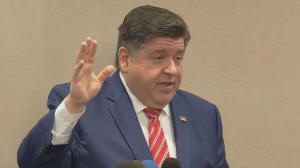|
The
$4 million is expected to cover meal costs for only the end of
the month. November was covered by $2 million from the Greater
Chicago Food Depository. The state has already provided $10.5
million in funding for food for new arrivals since they began to
show up in the Windy City, bringing the total now to $12.5
million just for food.
Illinois has spent more than $500 million in taxpayer funding to
care for the migrants since they arrived.
Pritzker said while the state is helping the city with funding,
Chicago should be the one with a plan.
"The city should be able to come up with a comprehensive plan on
its own," Pritzker said. "The state has stepped in for the last
two months and thank goodness for the Greater Chicago Food
Depository."
The spending for the state to deal with the migrant crisis
continues to increase; last month, Pritzker announced another
$160 million investment through the Illinois Department of Human
Services.
Additionally, Illinois' migrant health care subsidies are
projected to be $831 million this fiscal year, or $300 million
over budget. In total, the state is expected to spend over $1
billion on non-citizen housing, health care, and other services.
Both Mayor Brandon Johnson and Pritzker have called on the Biden
administration for help with costs.
"In Illinois, we welcome asylum-seeking families with dignity,
and that means ensuring they don't go hungry," Pritzker said.
"The state is continuing to make strategic investments in the
absence of the resources and coordination we continue to
advocate for from Congress and the federal government."
Johnson said last month that this is not just a Chicago problem.
"This is a national problem. It is an international problem,"
Johnson said. "The federal government has to do more."
According to state numbers, other investments coming from state
taxpayer funds include $30 million to put up a large intake
center for those coming to Chicago who are seeking an
alternative final destination, $65 million to erect and contract
operations for two shelters as part of the existing city of
Chicago shelter system, and $65 million in increased funding to
expand the wraparound services the state currently provides at
city shelters.

|
|




